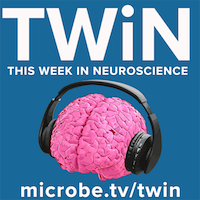The paper discussed in this episode of TWiN has been retracted by the authors, one of whom was the guest on this podcast. Hence the recordings have been deleted. Below is the retraction notice from Cell
Retraction Notice to: Genomic Decoding of Neuronal Depolarization by Stimulus-Specific NPAS4 Heterodimers
G. Stefano Brigidi ∙ Michael G.B. Hayes ∙ Nathaniel P. Delos Santos ∙ Andrea L. Hartzell ∙ Lorane Texari ∙ Pei-Ann Lin ∙ Anna Bartlett ∙ Joseph R. Ecker ∙ Christopher Benner ∙ Sven Heinz ∙ Brenda L. Bloodgood
(Cell 179, 373–391.e1–e27; October 3, 2019)
This article has been retracted at the request of the authors.
In this publication, we, the authors, described two induction mechanisms that lead to the expression of NPAS4 and the formation of stimulus-specific heterodimers. After unsuccessful efforts within the Bloodgood lab to recapitulate the core results, we reexamined the original image files and uncovered irregularities associated with data collected and analyzed by the first author, G. Stefano Brigidi. We determined that replicates were fabricated and that images misrepresented all or substantial parts of Figures 1–4 and the associated supplemental figures. We reported this to our institution, University of California San Diego, and the institution appointed an ad hoc committee that conducted an independent investigation. This committee concluded that Dr. Brigidi was responsible for the fabricated and/or falsified results. It was found that Figures 1A–1J, 1L–1T, 2B–2P, 3B–3I, 4C–4G, and 4J–4Q and the supplemental Figures S1A–S1J, S2A–S2H, S3A–S3T, S5B–S5G, and S6A–S6H were manipulated by combining and falsifying datasets to increase n values and altered confocal imaging signals and their quantification. The findings of research misconduct from the Department of Health and Human Services are published and also support the retraction of the paper (https://www.federalregister.gov/documents/2024/04/10/2024-07575/findings-of-research-misconduct). We do not stand by the conclusions drawn in this paper and are retracting it. We apologize to the scientific community for any loss of time, resources, and/or morale caused by this publication.

